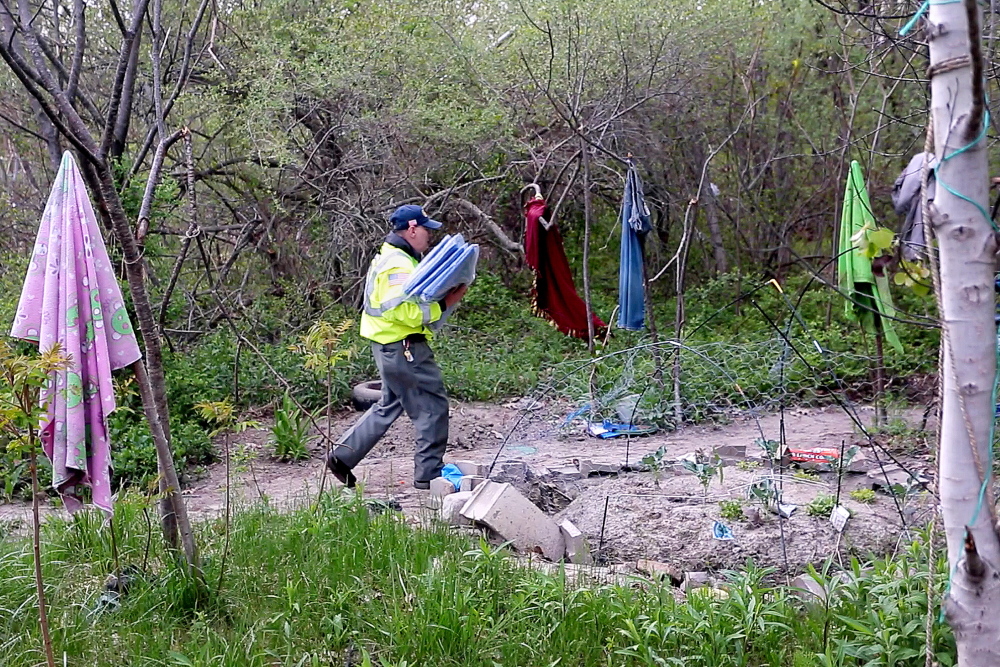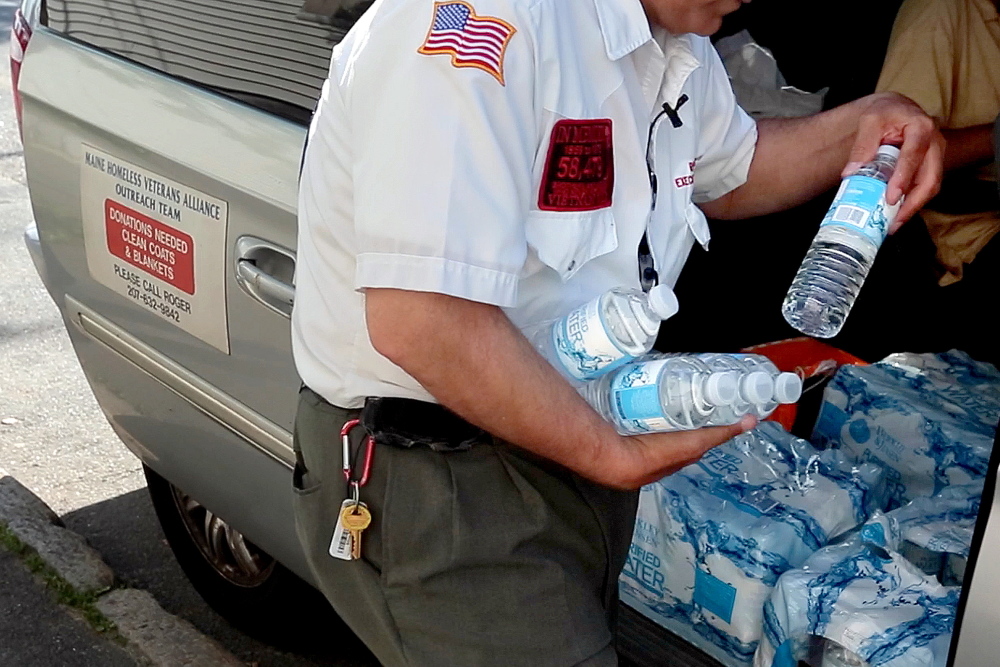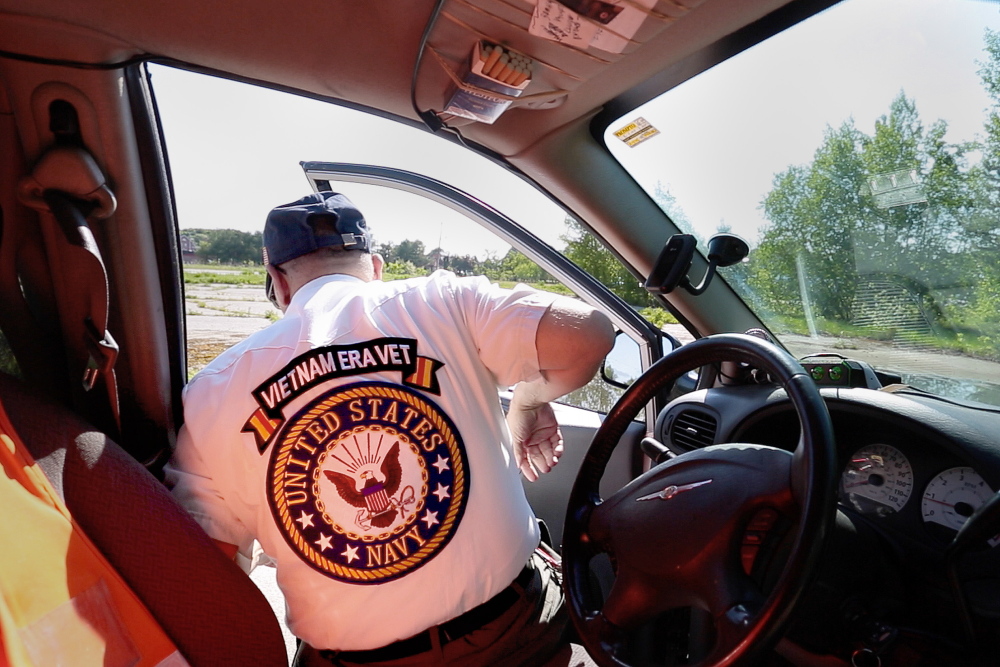It’s hard to miss Roger Goodoak.
As he strides down a well-worn path behind a shopping center in Portland, Goodoak is wearing a neon-yellow jacket with “Vietnam Era Vet” and “United States Navy” emblazoned across the back. He’s carrying an armload of bright-blue plastic tarps.
“They really need these out here,” he says.
“They” are the half-dozen or so homeless people camped out deep in the woods off Brighton Avenue, who, in warm weather, prefer the outdoors to sleeping in the city shelter.
Outsiders aren’t welcome here. But Goodoak, 60, doesn’t expect any trouble.
“I’ve never felt fear coming out here,” he says. “Once they meet me and recognize who I am, everything usually goes smoothly. They realize I’m just here to help.”
He spies two makeshift tents. Near one of them, a middle-aged man is sitting on a milk crate smoking a cigarette.
“How you doing?” Goodoak says. “You’re Phil, right?”
In the next tent over, Carl McKenney, 51, crawls out from under a pile of clothes and blankets and Goodoak hands him a tarp. McKenney appreciates the help.
“I was asleep one night, and I heard him out here (leaving supplies),” McKenney says. “And I was like ‘cool.’ Good man.”
In 2012, Goodoak, a Massachusetts native who moved to Maine 18 years ago, founded the nonprofit Maine Homeless Veterans Alliance. His primary goal is to connect homeless vets to the help they’re eligible for through the Department of Veterans Affairs – in hopes of getting them off the street.
“Sometimes they don’t want to go back in the system,” he says. “Sometimes they just need access to water or blankets or a sleeping bag. If that’s what they want, I’ll do my best to get it for them.”
It’s his way of paying it forward.
Goodoak spent 14 years in the Navy and, after he left the service, almost as many years homeless himself.
“I was a drunk,” he says matter-of-factly. “I got out of the Navy in 1986. I drank and went from state to state. I can remember being so hungry somebody bought me a hot dog and it was the best thing I ever ate.”
It wasn’t until staff members at the Oxford Street Shelter helped him reconnect to the VA that he was diagnosed with schizophrenia and began taking medication. He says the people at the shelter didn’t just change his life, they saved it.
“I was so impressed with the tireless ways they worked for me,” he says. “They really cared.”
Today, Goodoak works tirelessly for others. He started out focusing on veterans, but it didn’t take long for him to expand his mission to lending a hand to anyone who’s homeless.
He spends his days driving around the city in an old Town and Country van with two American flags waving on the roof, handing out blankets, T-shirts, socks, shoes – whatever donations he’s collected that week. He uses bottled water as an ice-breaker.
“It’s amazing,” he says. “You approach someone, hand them a water and say, ‘Hey, buddy, how you doing? Tell me your story.’ And they do.”
When he sees a need, he tries to fill it.
“I found out the men’s shelter was low on towels,” he says. “And I just had Embassy Suites (donate). This is the second time that hotel has given me linens and bags of towels.”
The alliance’s only other full-time volunteer, Kevin Nicholson, collects and delivers furniture donations for veterans who are moving from the street into apartments.
Arnie Macdonald, an attorney with Bernstein Shur who helped Goodoak incorporate the nonprofit and is now a friend and mentor, says Goodoak doesn’t get paid for the work he does as executive director, and doesn’t expect to.
“It’s a total calling for him,” Macdonald says. “Roger literally goes out and gives people the clothes off his back. He has gone home and gotten his own clothes or his family’s clothes and given them out when he hasn’t had enough donations.”
Goodoak lives in a downtown apartment with his two children, 16-year-old Kevin and 14-year-old Briana. Both kids seem to be following in their father’s footsteps.
“My kids do random acts of kindness every day,” he says, his eyes filling with tears. “My son has spoken up in school saying I needed coats (for the homeless).”
On the streets, Roger Goodoak is enveloped in a world of hurt. But that’s not all he sees.
“I see the good in people. I always see the good.”
And he sees hope.
“I don’t give up on people,” he says. “Ever.”
Send questions/comments to the editors.




